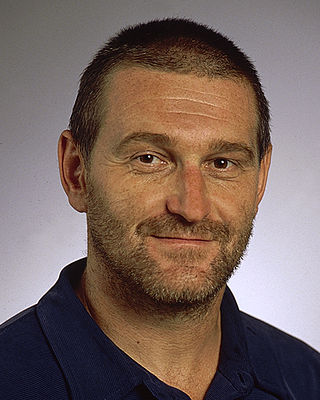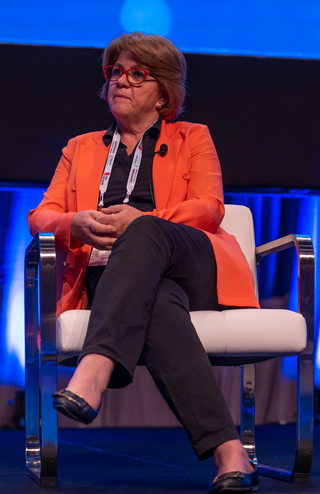
The University of California, San Diego is a public land-grant research university in San Diego, California. Established in 1960 near the pre-existing Scripps Institution of Oceanography, UC San Diego is the southernmost of the ten campuses of the University of California, and offers over 200 undergraduate and graduate degree programs, enrolling 33,096 undergraduate and 9,872 graduate students. UC San Diego is considered to be among the best universities in the world. Several publications have ranked UC San Diego’s biological sciences and Computer Science departments to be among the top 10 in the world. The university occupies 2,178 acres (881 ha) near the coast of the Pacific Ocean, with the main campus resting on approximately 1,152 acres (466 ha).
Paul Montgomery Churchland is a Canadian philosopher known for his studies in neurophilosophy and the philosophy of mind. After earning a Ph.D. from the University of Pittsburgh under Wilfrid Sellars (1969), Churchland rose to the rank of full professor at the University of Manitoba before accepting the Valtz Family Endowed Chair in Philosophy at the University of California, San Diego (UCSD) and joint appointments in that institution's Institute for Neural Computation and on its Cognitive Science Faculty.

Larry Lee Smarr is a physicist and leader in scientific computing, supercomputer applications, and Internet infrastructure from Missouri. He currently works at the University of California, San Diego. Smarr has been among the most important synthesizers and conductors of innovation, discovery, and commercialization of new technologies – including areas as disparate as the Web browser and personalized medicine. In his career, Smarr has made pioneering breakthroughs in research on black holes, spearheaded the use of supercomputers for academic research, and presided over some of the major innovations that created the modern Internet. For nearly 20 years, he has been building a new model for academic research based on interdisciplinary collaboration.

Forest Rohwer is an American microbial ecologist and Professor of Biology at San Diego State University. His particular interests include coral reef microbial ecology and viruses as both evolutionary agents and opportunistic pathogens in various environments.
Trey Ideker is a professor of medicine and bioengineering at UC San Diego. He is the Director of the National Resource for Network Biology, the San Diego Center for Systems Biology, and the Cancer Cell Map Initiative. He uses genome-scale measurements to construct network models of cellular processes and disease.

Pavel Arkadevich Pevzner is the Ronald R. Taylor Professor of Computer Science and director of the NIH Center for Computational Mass Spectrometry at University of California, San Diego. He serves on the editorial board of PLoS Computational Biology and he is a member of the Genome Institute of Singapore scientific advisory board.

Curtis Huttenhower is a Professor of Computational Biology and Bioinformatics in the Department of Biostatistics, School of Public Health, Harvard University.
Sarkis Mazmanian is an American medical microbiologist who has served as a professor at the California Institute of Technology since 2006. He is currently the Luis & Nelly Soux Professor of Microbiology in the Division of Biology and Biological Engineering, and a board member of Seed. Prior to this, Mazmanian was affiliated with Harvard Medical School and the University of Chicago. In 2012, Mazmanian was awarded a MacArthur Fellowship for his pioneering work on the human microbiome.
Catherine Anne Lozupone is an American microbiologist who specializes in bacteria and how they impact human health. Her noted work in trying to determine what constitutes "normal" gut bacteria, led to her creation of the UniFrac algorithm, used by researchers to plot the relationships between microbial communities in the human body.
Michael Andrew Fischbach is an American chemist, microbiologist, and geneticist. He is an associate professor of Bioengineering and ChEM-H Faculty Fellow at Stanford University and a Chan Zuckerberg Biohub Investigator.
Christensenella is a genus of non-spore-forming, anaerobic, and nonmotile bacteria from the family Christensenellaceae. The species C. minuta has been published and validated, and C. timonensis and C. massiliensis have been proposed as novel species of the genus Christensenella, all isolated from human feces. C. minuta in the gut has been associated with reduction in body weight and adiposity of mice. In a test on 977 volunteers, humans with higher levels of Christensenella in their guts were found to be more likely to have a lower body mass index than those with low levels. Christensenella are better represented in persons who are metabolically healthy. However, there is a link to possible pathogenic qualities of C. minuta in humans. An 18-year-old male presented with symptoms of appendicitis. Lab work revealed C. Minuta was found in his bloodstream. Upon removal of the appendix, his symptoms and blood levels of C. minuta disappeared.
Moselio "Elio" Schaechter is Distinguished professor emeritus at Tufts University, and adjunct professor at both San Diego State University and University of California, San Diego. His work focuses on microbiology.
B. Brett Finlay, is a Canadian microbiologist well known for his contributions to understanding how microbes cause disease in people and developing new tools for fighting infections, as well as the role the microbiota plays in human health and disease. Science.ca describes him as one of the world's foremost experts on the molecular understanding of the ways bacteria infect their hosts. He also led the SARS Accelerated Vaccine Initiative (SAVI) and developed vaccines to SARS and a bovine vaccine to E. coli O157:H7. His current research interests focus on pathogenic E. coli and Salmonella pathogenicity, and the role of the microbiota in infections, asthma, and malnutrition. He is currently the UBC Peter Wall Distinguished Professor and a Professor in the Michael Smith Laboratories, Microbiology and Immunology, and Biochemistry and Molecular Biology, and Co-director and Senior Fellow for the CIFAR Humans and Microbes program. He is also co-author of the book Let Them Eat Dirt: Saving Your Child from an Oversanitized World and The Whole-Body Microbiome: How to Harness Microbes - Inside and Out - For Lifelong Health. Finlay is the author of over 500 publications in peer-reviewed journals and served as editor of several professional publications for many years.
Timothy David Spector is a British epidemiologist, medical doctor, and science writer.
Michelle O'Malley is an American chemical engineer and professor at the University of California, Santa Barbara. She is known for her work studying the use of anaerobic microbes in developing inexpensive biofuels. In 2015 she was named as one of MIT Technology Review's 35 Innovators under 35, and in 2016 she received the Presidential Early Career Award for Scientists and Engineers.
Rachel Dutton is an American microbiologist. She has developed the microorganisms that live on cheese into a model system for complex interacting microbial communities. She has worked with chefs including Dan Felder, head of research and development at Momofuku to develop new fermentation procedures to be used in food and has been called the "go-to microbiologist" for chefs and gastronomists.
Jeffrey Dean Leach is an American businessman and microbiome researcher from Texas. He is known for his work on the gut microbiome of the Hadza hunter gatherers, founding the Human Food Project, publishing archeology magazines, deceptive business practices, being accused of sexual assault, and founding the Naked Pizza restaurant chain.

Maria Gloria Dominguez-Bello is a Venezuelan-American microbial ecologist that has worked on adaptations of gut fermentation organs in animals, gastric colonization by bacteria, assembly of the microbiota in early life, effect of practices that reduce microbiota transmission and colonization in humans, and effect of urbanization. She is the Henry Rutgers Professor of Microbiome and Health at Rutgers University, New Brunswick. She is the Director of the New Jersey Institute for Food, Nutrition, and Health. Her lab at Rutgers collaborates in multidisciplinary science, integrating microbiology, immunology, pediatrics, nutrition, anthropology, environmental engineering and architecture/urban studies, and microbial ecology.

Peter J. Turnbaugh is a microbiologist and a professor at University of California, San Francisco. He is known for his research on the metabolic activities performed by the trillions of microbes that colonize humans' adult bodies. Turnbaugh and his research group use interdisciplinary approaches in preclinical models and human cohorts to study the mechanisms through which the gut microbiome influences nutrition and pharmacology.
Raghuveer Parthasarathy is an American biophysicist, and an Alec and Kay Keith Professor of Physics on the faculty of the University of Oregon.







